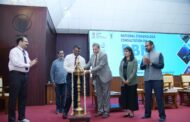New Delhi, August 26: With seaweed cultivation and production in India remaining abysmally low, the Centre on Thursday pitched for active industry support to create a demand-driven ecosystem that promotes sustainable growth and reduces the country’s dependence on imports.
Union Fisheries Secretary, Jatindra Nath Swain, alluded to the role of the processing sector in creating a vibrant aquaculture industry and stressed replicating a similar model in the area of seaweed cultivation to unlock India’s potential in this sector.
India has an 8000 km long rich bio-diverse coastline but its contribution to the global seaweed production stands at around 2500 tons. Smaller South-East Asian nations, in comparison, enjoy a broad-based and well laid out thriving seaweed industry.
Inaugurating the Seaweed India 2021 virtual conclave, organized by SMART AGRI POST, Swain spoke of Government’s initiative under Pradhan Mantri Matsya Sampada Yojana (PMMSY), while underscoring industry partnership to supplement efforts for the fledgling industry.
He in particular referred to the sugarcane cultivation to buttress his observation and mentioned the significant impact the sugarcane industry has brought to the lives of the farmers through assured offtake and remuneration.
The country has set a production target of 11.5 lakh tonnes in the next five years, even as the global seaweed market size is projected to reach USD 25 billion by the turn of this decade.
To give a boost to the cultivation, the secretary indicated the establishment of multipurpose seaweed parks in the coastal states to promote seaweed cultivation in a big way. The first of such parks is coming up in Tamil Nadu, the detailed project report of which is being finalised.
He said the States should look into framing unambiguous rules for seaweed farming to avoid legal issues and focus on the creation of seed banks for sustained cultivation.
Referring to the Independence Day address where Prime Minister Narendra Modi laid stress on seaweed cultivation, Swain voiced optimism that the industry-led growth will help India attain its initiative towards a ‘blue revolution’.
Aquaculture and seaweed farming, he said, is also critical in India’s context in the coming decades when the overgrowing population will lead to the saturation of land available for traditional agriculture farming. “We have to (then) move from land-based production system to sea-based production system”.
Seaweed farming can also transform coastal areas into commercial hubs, generating incomes and improving the livelihoods of the farming community living on the margins.
Joint Secretary in the Department of Fisheries Dr J Balaji emphasized on the availability of seed, the scale of production and sales to give the required push to the sector. “We wanted a head start and included seaweed cultivation under PMMSY. The Finance Minister in her budget speech this year has also announced a seaweed park for Tamil Nadu to help the sector to take off”.
Dr Balaji informed that projects worth Rs 25 crore was approved last year and added that some major industries have also come up in Tamil Nadu to exploit the potential of seaweed farming.
“We are late but we can learn from other countries,” he said. Talking about the economic opportunities, he drew attention to some farmers of Tuticorin in Tamil Nadu who earned Rs 1.5 lakh last year in midst of the Covid outbreak from seaweed cultivation.
DDG-Fisheries, ICAR, Dr J K Jena said the time has come for India to show its accomplishment in the aquaculture sector and potential for seaweed cultivation. He emphasized technology to ramp up production initiatives including climate resilience technology.
While highlighting issues and challenges such as nutrient enrichment, Dr Jena strongly recommended the availability of quality seed for farming with the establishment of seed banks at several locations.
(Please share your experience, interesting news articles and case studies at aquapostnews@gmail.com)





